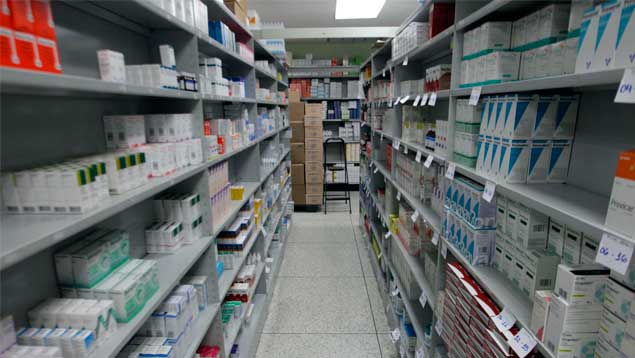New Program Unveiled to Combat Medicine Shortages in Venezuela
Venezuelan health minister, Henry Ventura, has announced a new program to improve consumer access to medicines through the coordinated participation of over 7,000 pharmacies nationwide.

Santa Elena, April 27th, 2015. (venezuelanalysis.com)- On Thursday, Venezuelan health minister Henry Ventura announced a new program to improve consumer access to medicines through the coordinated participation of over 7,000 pharmacies nationwide.
The denominated Integral System for Access to Medicines (SIAMED) prioritizes patients with illnesses that require regular treatment such as heart disease, diabetes, and neurological disorders.
These patients must apply at their local pharmacy with a doctor’s note or documentation of their condition, and will be updated by SMS text message when their medicine is in stock. In this way, the government ensures that certain medicines will be set aside for those who need them, rather than bought and resold on the booming black market. In Venezuela, official prescriptions are not necessary for the purchase of most medicines.
SIAMED is also meant to prevent the nervous buying, or hoarding, that has become common practice as a result of periodical shortages in the South American nation.
In 2014, when a wide variety of medicines and medical supplies became scarce, the government attributed the shortages to “economic sabotage”. It maintained that importers were reselling large amounts of their government-allotted dollars on the black market to make exorbitant profits, as opposed to using them for importing medicines.
The government offers a highly subsidized rate of 6.3 bolivars to the dollar to importers of pharmaceutical goods in an attempt to make medicine easily accessible to the poor— but each of those dollar can fetch up to 280 bolivars on the illicit parallel market.
But Bolivarian officials argue that beyond profit, many powerful industries, or the elite Venezuelans who control them, are bent on creating shortages in an ongoing effort to create chaos and discredit the socialist government.
In October, Venezuelan authorities uncovered two warehouses in Aragua state brimming with medical supplies, including 5,000 wheelchairs, rubber gloves, and thousands of syringes. According to reports, the cache held goods hoarded by the owners of two companies who had received 204 million preferential dollars for import since 2004. At the time, two arrest warrants were issued and the items were distributed through government missions.
However, business leaders and opposition supporters maintain that the country’s shortages stem from insufficient dollars for import.
On Saturday, the conservative director of the country’s Pharmaceutical Federation, Freddy Ceballos, said that the root of the problem is a US$4 billion public debt to international suppliers.
According to the country’s defender of public rights, Tarek William Saab, SIAMED is the product of input from the country’s citizens. The program was devised by an initiative of the Health Ministry, which set up work tables in hospitals and encouraged the participation of both patients and clinical staff.
Those who do not apply to SIAMED will be able to buy medicine as before, though they will not be notified of its arrival.
